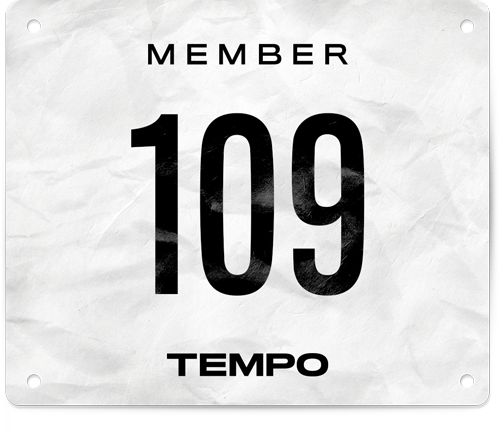Performance
Jessica Stenson: The Race Mindset
Get Ready For The Start Line With The Olympian’s Top Tips
Fresh from winning the Launceston Half Marathon, Olympian Jessica Stenson has 10 tips (and a bonus pointer) to help you calm your nerves and get the most out of your next race
As a three-time Olympian with three back-to-back Commonwealth Games medals under her trainers, Aussie athlete Jessica Stenson has a resumé many of us can only dream about.
But as I sit across from the 37-year-old marathon star and mother of two—who later tells me she was breastfeeding her then six-month-old daughter when she PB’d at last year’s Daegu Marathon in Korea, earning herself a qualifying time for the Paris 2024 Olympics—I realise that we might have more in common than I thought.
“As a child, I hated the feeling leading into a race,” she tells me over a mug of tea. “I’d think about it for weeks and not sleep well. I think I was scared that when it got tough in the race, I wouldn’t be able to push through that. I just hated the feeling in the lead-up, but then once the gun had fired I always loved it.”
“I draw confidence from the training I’ve done and from my previous experiences. As a young runner, I didn’t have that experience behind me.”
Jess Stenson
Race nerves are something that can get the better of anyone and have us doubting why we even signed up for a run in the first place.
But since Jess first hit the cross country track as a five-year-old, she’s learned how to leave the nerves behind and put herself in the best frame of mind by the time she arrives at the start line.
“The nerves I feel before a race are different now,” explains the Olympian, who competed at the London, Rio and Paris games. “It’s more a sense of anticipation and excitement, rather than fear.
“I draw confidence from the training I’ve done and from my previous experiences. As a young runner, I didn’t have that experience behind me and wasn’t training specifically for running so there were a lot more unknowns.”
“It’s nice to line up for races now, knowing that I’ve been able to work through a variety of different scenarios in the past, and I trust that I will have the tools I need to get the most out of myself in the race.”
As a lululemon ambassador, and someone who won medals at the consecutive Glasgow, Gold Coast and Birmingham Commonwealth Games from 2014 to 2022, she’s now on a mission to help others get into the race mindset, and I – as the co-founder of Sydney’s Coogee Run Club – was all ears during a one-on-one coaching session with the legend herself.
Because, according to the gold medallist, just like taking gels to get you through a marathon, there are plenty of mental techniques we can use to get our bodies and minds through a race.
One. Familarise yourself with the course
It all starts with getting your head in the game, and, when it comes to running, the best way to do that is by acquainting yourself with the route.
“When it's a technical course, I think it's valuable to know what's coming,” Jess explains. “It’s just nice to know what you’re dealing with, particularly if it’s wet.
“But if it's a really simple course, I don't think it's as necessary.”
Two. Lean into the taper
We all know it’s important to reduce your training volume and intensity in the last couple of weeks before a marathon to give your body a chance to recover. Unfortunately, cutting down on running volume and intensity in the lead up to race day gives your mind a lot more free time to start wondering.
“People have been really busy, fitting in training and work, and then suddenly when they’d usually be doing their training sessions, they’ve got this free time – and that can be time when they get in their head and I think that can be a really hard time for some people,” Jess says.
For me, the closer I got to April’s TCS London Marathon, the more I doubted myself. I remember thinking, “I’m not fit enough,” “I don’t have it in me,” “My training hasn’t been good enough,” “I’m not going to get a PB,” “I’m just not there yet.” These are the intrusive thoughts that live in my head rent-free the week before a race, and they can be pretty detrimental.
“Think, ‘I’m not being lazy, I'm just giving my body every chance to rest.’”
Jess Stenson
“This is when people can try to chase fitness, when you can’t get fitter in the final 10 days,” Jess argues. “Or they want to prove to themselves that they’re fit, so they try to go hard or get some good splits to reassure themselves.”
Neither of which are going to improve your race time.
The key, Jess says, is to believe in yourself.
“If you can just trust your training and allow yourself to dial everything back in life, to get yourself feeling fresh in the final few days, that’s really important,” stresses Jess. “Think, ‘I’m not being lazy, I'm just giving my body every chance to rest.’”
Three. Get a week’s worth of good sleep
’Twas the night before a race and all the creatures were stirring because they were too excited, too nervous, and too full of anticipation to get a decent sleep.
Which only leaves you feeling more wired and worried, but according to the expert, it’s nothing to get yourself worked up about.
“I’ve had some terrible sleeps the night before the race and the race has been fine,” Jess explains. “I don't think the night before really matters because you wake up and you've got all that adrenaline.”
What we should be doing, however, is giving ourselves the best chance to sleep in the week before a race.
“I’ve had some terrible sleeps the night before the race and the race has been fine.”
Jess Stenson
“If I get eight plus hours a night I feel strong,” Jess says, adding that this means you need to be in bed for longer than that.
“My sleep can be really disrupted, so if I’m in bed for 10-and-a-half hours hopefully I’ll get eight-and-a-bit with all the waking.”
And even if you can’t sleep?
“Look, sometimes it just isn't happening with sleep, and then you've got to say, ‘Well, if I'm listening to something calming, or at least if I'm lying here resting, I’m better off’,” she says. “The worst thing, I think, is when you're really stressing about not sleeping.”
Four. Have a race plan
As the saying goes, “Those who fail to prepare, prepare to fail,” so don’t leave home without a race-day strategy.
“While knowing that things within or outside of your control might change it, at least having a plan to start with, for some people, works really well, and they just stick to that plan, like ticking off boxes,” the Olympian says.
“For others though, it could be dangerous because if something happens that forces them to deviate from it, it can throw them.
“So you have to know yourself, but I do think knowing the paces you've been practising in training, really believing in your strategy, and then keeping yourself accountable and not getting too caught up in it is important, rather than going in just like, ‘Uh, I’ll see what happens.’”
Five. Focus on the process rather than outcomes
We all go into an event hoping for our best – whether it’s a finish time, pace or PB. But that can put a huge amount of pressure on our minds.
So, how can you deal with that?
“Every time you start panicking about the result, just think about the process rather than outcomes,” suggests Jess.
“Like, ‘I’ve got to get up at this time, I’ve got to catch the bus to get there, then I’ll start warming up here and go to the toilet there’. And then in the marathon, you can break it up really nicely into the different fuelling stations. Or some people like to break the course into thirds or half or just have little chapters, and then work through each chapter before closing it and moving onto the next.
“It’s just thinking about each step, rather than the whole picture. Even if you can just write the odd little list of your processes down and then keep coming back to that, moment by moment, rather than thinking about what might happen at the end.”
Six. Prepare your mind for the tough spots
Whether you’re an amateur runner or a professional athlete, nearly every marathon runner will hit a wall, that point in a race when your body just runs out of steam.
For most, it’s usually somewhere between 30 and 42 kilometres, and understanding when it affects you can be the difference between a PB or a DNF.
“I know where mentally it gets tough for me typically in races, but hitting the wall, that's something you can't really predict,” the elite marathoner says. “In 2018 at the Commonwealth Games on the Gold Coast, it was the worst I’ve felt at that 35 to 37 kilometre mark. I really had to go with visualisation and occasionally looking into the crowd and using the power from the support.”
“Being able to switch between associative and dissociative strategies within a race is really good, as well as knowing when one strategy isn’t working for you so you can move on to the next one.”
Jess Stenson
It’s these kinds of mental strategies that are key to coping when all you want to do is quit.
“There’s associative and dissociative strategies you can use mentally,” Jess says.
“So the associative is more internal thinking, like, ‘How's my breathing?’ or ‘How's my body feeling?’ and then really checking in with yourself. When I get fatigued during a run, my head tends to tilt back and I lift my shoulders. So I think chin down, run tall, shoulders relaxed, tuck my tailbone under, or pull my ribs in. And then I think about how my feet are hitting the ground. You want it to be even, not too slappy. Think of it as flowing through each step.”
Then there’s dissociative strategies which, according to Jess, are when you deliberately shift your concentration away from your body.
“You’re like, ‘There’s a tree there, just get to that tree.’ Or I might think of a coach who's had such an impact on my life.”
Or, if you’re a more visual person, maybe you could picture training runs or past races. “In my last marathon, the Tokyo Marathon, I went through all of my 18 marathons prior and that took up like half of the race,” Jess says. “I was thinking about the start of each race, sections throughout, and the finish, and then I just rolled through each marathon. And every now and then I'd look at where I was in the Tokyo Marathon and I'd be like, ‘Oh that's how I felt in that race at this point,’ and that was almost meditative. It just took me away from the discomfort, and it’s reassuring when you can directly compare a point in a race that went well, if you weren't feeling so well in another race.”
It basically boils down to having something to think about.
“Being able to switch between associative and dissociative strategies within a race is really good, as well as knowing when one strategy isn’t working for you so you can move on to the next one,” explains Jess.
“It’s a little safe but empowering thing going into a race knowing that you’ve got something to help you when you get to that point.”
Seven. Have your people cheering on the sidelines
Amid the throng of thousands of spectators, seeing your family and friends in the crowd is one of the best feelings during a race.
“That was such a perk of last year’s Olympic Games in Paris,” Jess says beaming. “My whole family was there and it made me feel really grounded, like it seems to almost take away the pressure when I have them out there to look for.”
The key is positioning your loved ones at challenging points on the course where you know you’re going to struggle.
“The Birmingham Commonwealth Games in 2022 was a good example,” explains the mother of five-year-old Billy and one-year-old Ellie. “My husband, Dylan, was like, ‘Where do you want us to be?’, and I said, ‘Like 33 to 34 kilometres’, and he ended up being at a few spots on the course.”
Two years later, Dylan was once again on the sidelines at the Paris Olympic marathon. “When I saw him there – and I'd been looking forward to seeing him and Billy and my family members at that spot – it gave me such a buzz,” Jess says. “And it was the same at the Paris Olympics in that I knew where my family was going to be. You spend a few kilometres looking forward to that and then there’s the buzz of seeing them.”
Eight. Look into the crowd
When family and friends are harder to spot on the sidelines than Where’s Wally?, all you need to do is look into the roaring crowd to get the ultimate boost because there’s nothing quite like a race to show off the best of humanity.
Take, for example, the TCS London Marathon in April when a record-breaking 800,000 spectators took to the streets to cheer on runners, or the TCS New York Marathon which is known for boasting audiences six people deep.
Having screaming strangers cheer you on is one of the greatest gifts in a race, and can be a major boost to get you to the finish line.
“Wherever I am in the world, there are times where I look at the crowd and I just catch someone's eye,” Jess says, “and it just lifts you up.
“It’s like a little moment with a stranger because you understand each other, and you’re like, ‘Thank you for being here today and cheering.’”
And while you’re at it, don’t forget to read the signs people are holding – they’re a great distraction from the pain of running.
“There'll be so many signs out there and there'll be one that you just see and you have a little giggle,” explains the Olympian.
Nine. Move through the feelings
Whether it’s a 5K or an ultra marathon, you’re going to pass through different emotional stages.
Fortunately, these can be pretty short lived.
“It’s important to accept that there will be waves of feeling really strong and waves of feeling fatigue and self-doubt, but not connecting or judging any of those feelings – just moving through the moments like, ‘Yeah, this happens, but I might feel good up the road.’
“I think it's when you connect to a feeling and you're like, ‘Oh no, what's going to happen down the road if I'm feeling this here’. For me personally, I will then stress about that and my breathing will start to get strained and progressively worsen.
“So just acknowledge that it’s normal to feel some waves, and that one tough patch doesn't mean it's going to be progressively tougher throughout the race.”
Ten. Focus on problem solving rather than predicting the future
It’s hard not to spiral when things go wrong during a race, but Jess says that can be detrimental.
“I think the biggest risk is when people then think ahead and predict what that means in the future and how it might impact their end result,” she explains.
“Instead, just dial things back and really go moment to moment. Maybe you need more fuel, maybe your legs are feeling a bit sore, or maybe your quads are cramping, so push through your calves a bit more and offload that area of your body.
“Just try to problem solve rather than predict the future.”
Bonus tip: Don’t forget to feel proud of yourself
While Jess’s top tips are all about getting you into a race mindset, sometimes you’ve just got to sit in your nerves and realise that they’re actually a pretty good thing. “At least nerves show that you really care about the run,” Jess says. “I think trying to switch that into a power and a strength just shows that you’re passionate.”
And at the end of the day, whether you got the time you wanted or not, never forget that running a marathon is such a feat in itself.
“I think if I've pushed myself as hard as I could on that day, I feel proud,” says the Olympian.
“You cross the line and you’re like, ‘What just happened?’, but as long as you’re always staying true to your values or the goals you’ve written on your hand, and you’ve tried to execute the process and you were strong mentally, then they're the things that I judge my race on.”


